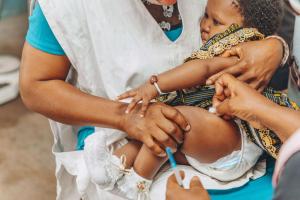Child health improves in Cameroon one year after malaria vaccine introduction
Yaounde – Ndzie Daniela and Ngah Daniel, twins, were the first children to receive the malaria vaccine when it was introduced in Cameroon on 22 January 2024. They have now received three doses of the vaccine and are both thriving. “My children are in excellent health. Since birth, they have never had malaria. Better still, I'd say they've never fallen sick,” says their mother Hélène Akono. “I must admit they've had a few teething problems, but nothing serious.”
As part of its routine immunization programme, Cameroon has incorporated the malaria vaccine through a four-dose protocol in 42 high-malaria-burden health districts. As of 31 December 2024, approximately 366 000 doses had been administered to infants.
To ensure high vaccine uptake, Cameroon has implemented continuous monitoring and parent mobilization strategies. However, in August, the Expanded Programme on Immunization (EPI) conducted a post-introduction mini-assessment and found that immunization coverage was below target.
In response, the country launched catch-up campaigns in September and December to immunize all children. These campaigns significantly increase immunization coverage of children who have received all three doses from 25% in April 2024 to 40% in September and 48% by the end of December. Meanwhile, first-dose immunization coverage stood at 65% by the year-end.
“The improved coverage, particularly for the third dose, demonstrates the success catch-up campaign, along with other interventions,” said Dr Njoh Andreas Ateke, EPI Deputy Permanent Secretary. The country is working towards fully integrating malaria immunization into future campaigns and leveraging other immunization activities to optimize coverage. “We must sustain and improve immunization coverage because the benefits for our children are tremendous.”
Initial findings from health facilities indicate a decline in malaria cases among children under five years old. In 2024, the 42 districts participating in Phase 1 of the vaccine roll-out reported 266 917 malaria cases, compared to 333 805 cases in 2023, a reduction of 66 888 cases.
“Before the vaccine was introduced, the situation was a concern. Hardly a day went by without cases of severe anaemia caused by malaria, a disease that is difficult to control,” said Rugayatou Sali, senior nurse and deputy head nurse in the paediatric department at the Soa District Hospital. “Throughout 2024, the situation improved for children aged six to 18 months. However, we are still recording severe malaria cases, particularly among children living in areas not covered by the malaria vaccine and those in the age group not covered by immunization.”
In order to significantly reduce the malaria burden in Cameroon, immunization efforts are being complemented by other preventive measures such as larval control, preventive treatment and use of long-lasting insecticide-treated mosquito nets.
“I haven't had a malaria case in my house for several months now. And this has helped save money in my purse. I'm very happy about it,” says Hélène. “I can't wait to take the twins for their fourth dose in July. However, I know the vaccine alone is not enough. We sleep under an insecticide-treated mosquito net and keep our environment clean.”
In 2024, 13 African countries in the African Region introduced the malaria vaccine into their routine immunization programmes. As part of the introduction in the various countries involved, the World Health Organization (WHO) and other partners supported national health authorities in strengthening key measures for the process.
The WHO Accelerated Malaria Vaccine Introduction and Rollout in Africa (AMVIRA) initiative has played a pivotal role as a coordinated platform supporting countries during this critical roll-out phase. Through AMVIRA, the WHO has mobilized resources, strengthened health system capacities and facilitated the provision of millions of doses of vaccine in these countries. Over 18 million doses of malaria vaccine were administered in the Region in 2024.
“This initiative demonstrates how WHO’s commitment to ensuring a healthier world where every child can access life-saving health interventions including immunization," said Dr Charles Shey, head of the vaccine-preventable diseases unit at WHO Regional Office for Africa.
In the short term, the WHO aims to scale up malaria immunization in the 13 participating countries and support the vaccine roll-out in eight new priority countries, while continuing to closely monitor data on vaccine administration and safety. “Our goal is to ensure that this vaccine complements other malaria-control interventions to help reduce malaria incidence and mortality by 90% by 2030”, says Dr Shey.
Prior to introducing the vaccine in Cameroon, a pilot programme in Ghana, Kenya and Malawi immunized over two million children against malaria in two-years. This has considerably reduced in all- cause infant mortality by 13% and severe malaria cases and hospitalization by 30% in these three countries.
Communications Officer
Regional Office for Africa
Email: lawsonagbluluf [at] who.int (lawsonagbluluf[at]who[dot]int)
Chargée de communication
OMS Cameroun
E-mail: wegangg [at] who.int (wegangg[at]who[dot]int)
